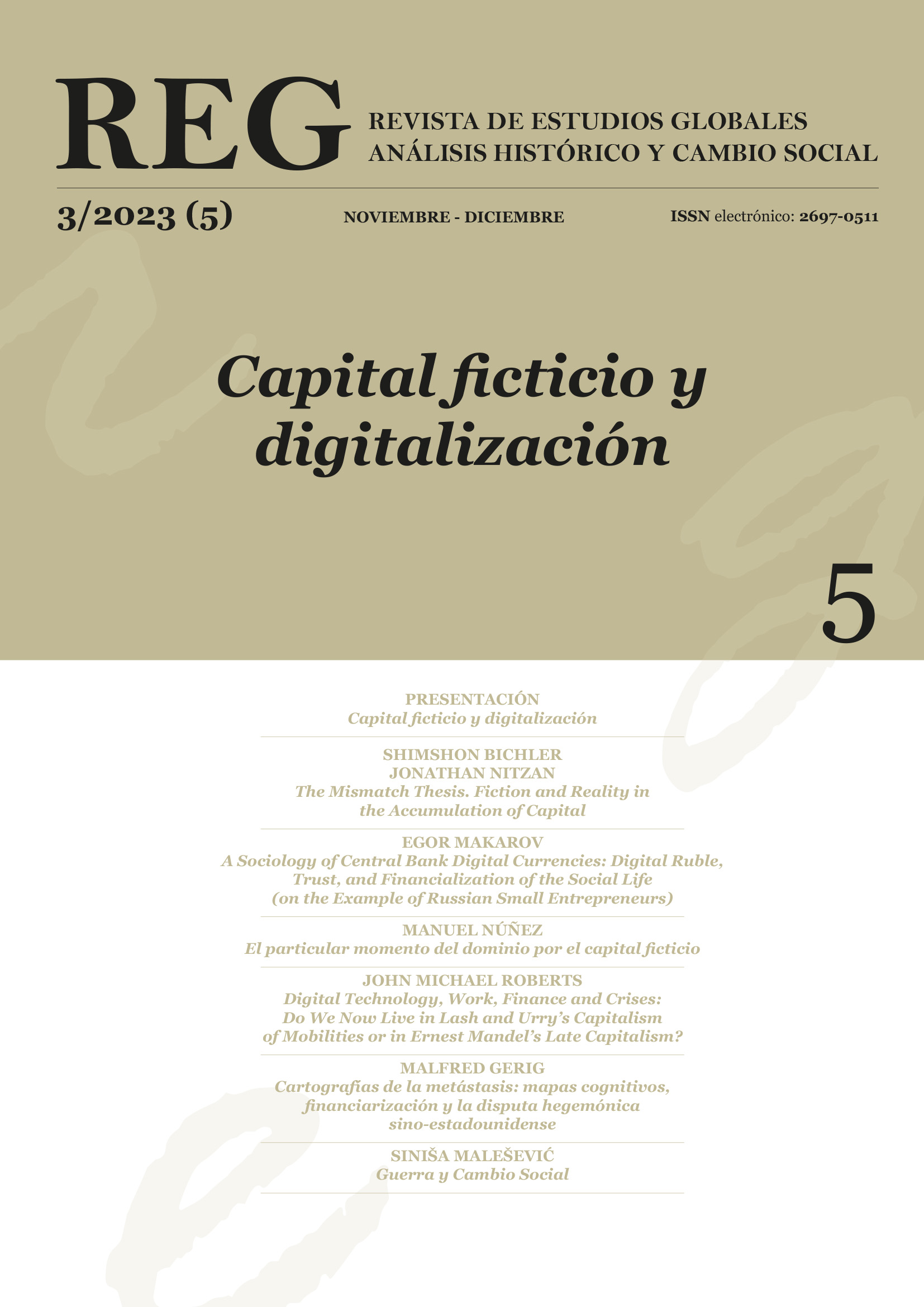A Sociology of Central Bank Digital Currencies: Digital Ruble, Trust, and Financialization of the Social Life (on the Example of Russian Small Entrepreneurs)
Resumen
Este artículo presenta un análisis sociológico de las monedas digitales de los bancos centrales y, en particular, del rublo digital. El desarrollo de la economía digital estimula la atención activa de los gobiernos de diferentes países. En algunos de ellos, incluida Rusia, una de las reacciones a esta evolución es la aparición de monedas digitales de los bancos centrales. Desde una perspectiva sociológica, el dinero es un proceso social integrado en las relaciones sociales. Uno de los principales aspectos a este respecto es la confianza. Este artículo analiza el problema de la confianza a nivel teórico como una característica sistémica de la red social que permite el paso de los medios monetarios al dinero como cuenta. El problema de la confianza afecta al nivel micro de la proliferación monetaria. Así pues, el artículo analiza las narrativas de la confianza, la elección y el cumplimiento utilizando 12 entrevistas con pequeños empresarios rusos. Distingue entre confianza impersonal, tecnológica e institucional y muestra patrones discursivos entre ellas. Los resultados que presenta el documento son que, en el plano de la narrativa, podrían distinguirse el optimismo y el escepticismo tecnológicos en relación con la percepción de la posibilidad de ampliar el control institucional. A nivel práctico, la confianza impersonal se identifica como un factor importante de la adopción del rublo digital. Las conclusiones del artículo encajan con la bibliografía sobre la proliferación monetaria y contribuyen a comprender las pautas de adopción de nuevas formas monetarias en la práctica.
Descargas
Métricas
-
Resumen286
-
pdf 183
Citas
Armstrong M. (2006) Competition in two-sided markets. Rand Journal of Economics. pp. 668-691.
Ailon, G. (2022) The Double Meaning of Money. Sociological Theory. 40(1): 82-97.
Avdeeva, D. (2019) Trust in Russia and its connection with the level of economic development. Social Science and Modernity [Obshchestvennye nauki i sovremennost]. No. 3. Pp. 79-93. (in Russian).
Bessonova, O. (2018). Integral-institutional paradigm and the Russian way: overcoming the defects of the concepts of Power–Property and XY matrices. Obshchestvennye nauki i sovremennost, (4), 129-144. (in Russian).
Bourdieu, P. (1998). Practical Reason—On the Theory of Action. Stanford, CA: Stanford University Press.
Barontini C, Holden H. (2019) Proceeding with Caution - a Survey on Central Bank Digital Currency. BIS Paper. No. 101.
Caliskan, K. (2023) Data Money: Inside Cryptocurrencies, Their Communities, Markets, and Blockchains, New York Chichester, West Sussex: Columbia University Press.
Carruthers B. (2009) A Sociology of Bubble. Contents, vol. 8, no 3, pp. 22–26.
Carruthers, B., Espeland, W. (1998) Money, Meaning, and Morality. American Behavioral Scientist. 41(10):1384-1408.
Central Bank Digital Currency Tracker. (2023, December 15). Atlantic council. https://www.atlanticcouncil.org/cbdctracker/
Digital ruble. Consultation Paper. The Bank of Russia. (2020) https://cbr.ru/eng/analytics/d_ok/dig_ruble/ (Accessed 15.12.2022).
Desan C. (2017) The Constitutional Approach to Money: Monetary Design and the Production of the Modern World. Money Talks: Explain How Money Really Works (eds. N. Bandelj, F. F. Wherry, V. A. Zelizer), Princeton: Princeton University Press, pp. 109-130.
Dodd N. (1994) The Sociology of Money: Economics, Reason & Contemporary Society, Michigan: Continuum.
Dodd, N. (2014) The Social Life of Money, Princeton; Oxford: Princeton University Press.
Dodd N. (2017) The Social Life of Bitcoin. Theory, Culture & Society. 35 (3): 35–56. URL: https://doi. org/10.1177/0263276417746464
Dodd N. (2007) On Simmel’s Pure Concept of Money: A Response to Ingham. European Journal of Sociology, vol. 48, no 2, pp. 273–294. DOI: 10.1017/S0003975607000379
Esposito. E. (2011) The Future of Futures. The Time of Money in Financing and Society. MA, Northampton.
Fligstein N. (2021) The Banks Did It: an Anatomy of the Financial Crisis. Harvard: Harvard University Press. 336 p.
Feinig, J. (2020) Toward a moral economy of money? Money as a creature of democracy, Journal of Cultural Economy, 13:5, 531-547, DOI: 10.1080/17530350.2020.1729223
Guseva A. (2008) Into the Red: The Birth of the Credit Card Market in Postcommunist Russia. Stanford: Stanford University Press.
Granovetter, M. (1985). Economic Action and Social Structure: The Problem of Embeddedness. American Journal of Sociology, 91(3), 481–510. http://www.jstor.org/stable/2780199
Giddens, A. (1986). The constitution of society. Polity Press.
Gunawan H, Langgu Sinaga B., Sigit Purnomo. (2019) Assessment of the Readiness of Micro, Small and Medium Enterprises in Using E-Money Using the Unified Theory of Acceptance and Use of Technology (UTAUT) Method. Procedia Computer Science 161:316–23.
Geertz, C. (2008). Thick description: Toward an interpretive theory of culture. In The cultural geography reader (pp. 41-51). Routledge.
Graeber D. 2011. Debt: The First 5000 Years. New York: Melville House Publishing.
Horne, D., Nickerson D., DeFanti M. (2015) Improving Supply Chain Efficiency Through Electronic Payments: The Case of Micro-Entrepreneurs in Kenya and Tanzania. Journal of Marketing Channels 22(2):83–92.
Ho, B. (2021). Why Trust Matters: An Economist’s Guide to the Ties That Bind Us. Columbia University Press. http://www.jstor.org/stable/10.7312/ho--18960
Ingham G. (2000) ‘Babylonian Madness’: On the Historical and Sociological Origins of Money. In: Smithin J. What is Money? London: Routledge. pp. 16–42.
Ingham G. (2004) The Nature of Money. Cambridge: Polity Press.
Karatani, K. (2003) Transcritique: On Kant and Marx. The MIT Press.
Kosals, L. (2022). Legitimation of innovation: The case of AI technology for facial recognition. In V. Radaev & Z. Kotelnikova (Eds.), The Ambivalence of Power in the Twenty-First Century Economy: Cases from Russia and beyond (pp. 80–99). UCL Press. https://doi.org/10.2307/j.ctv280b65x.13
Kinney, A. (2021) Embedding into an Emerging Money System: The Case of Bitcoin. Sociological Focus. 54(1): 77-92.
Keynes J. M. (1930) A Treatise on Money, Cambridge: Cambridge University Press.
Knapp G. F. (1924) The State Theory of Money, London: Macmillan.
Krippner, G. (2011) Capitalizing on Crisis: The Political Origins of the Rise of Finance. Harvard University Press.
Law on Digital Ruble Adopted. (2023, December 15). Bank of Russia. https://www.cbr.ru/eng/press/event/?id=16900
Luhmann, N. (1995) Social Systems. Stanford: Stanford University Press.
Luhmann, N. (2018). Trust and power. John Wiley & Sons.
MacKenzie, D., Millo, Y. (2003) Constructing a Market, Performing Theory: The Historical Sociology of a Financial Derivatives Exchange. American Journal of Sociology. 109(1): 107-145.
Makarov, E. (2020) Sociological Problem of Trust in Money Currencies: An Institutional Factor. Journal of Sociology and Social Anthropology. No 5. Pp. 135-154. (in Russian) https://doi.org/10.31119/jssa.2020.23.5.5
Marx, K. (2005). Grundrisse: Foundations of the critique of political economy. Penguin UK.
Menger K. (1892) On the Origins of Money. The Economic Journal. 2 (6): 239–477.
Polillo S. (2011) Money, Moral Authority, and the Politics of Creditworthiness. American Sociological Review. Vol. 76. No. 3. Pp. 437 –464.
Polillo, S. (2022) From Collateral to Money: Social Meaning, Security Devices and the Law in the Depersonalization of Monetary Relationships. Journal of Cultural Economy. 15(3): 310-325.
Rysman M. (2007) Empirical Analysis of Payment Card Usage. Journal of Industrial Economics. 55 (1): 1–36. DOI: 10.1111/j.1467-6451.2007.00301.x
Smith, A. (2002) The Wealth of Nations. Oxford, England: Bibliomania.com Ltd. [Web.] Retrieved from the Library of Congress, https://lccn.loc.gov/2002564559.
Shapiro, S. (1987) The Social Control of Impersonal Trust. American Journal of Sociology. 93(3): 623-658.
Simmel G. (2011) The Philosophy of Money. London: Routledge.
Small, M. (2009) ‘How Many Cases Do I Need?’ On Science and the Logic of Case Selection in Field-Based Research,” Ethnography 10(1): 5-38.
Spang, R. (2015) Stuff and Money in the Time of the French Revolution. Cambridge: Harvard University Press.
Zuboff, S. (2019) The Age of Surveillance Capitalism: The Fight for a Human Future at the New Frontier of Power. New York: PublicAffairs.
Derechos de autor 2024 Revista de Estudios Globales. Análisis Histórico y Cambio Social

Esta obra está bajo una licencia internacional Creative Commons Atribución-NoComercial-SinDerivadas 4.0.










